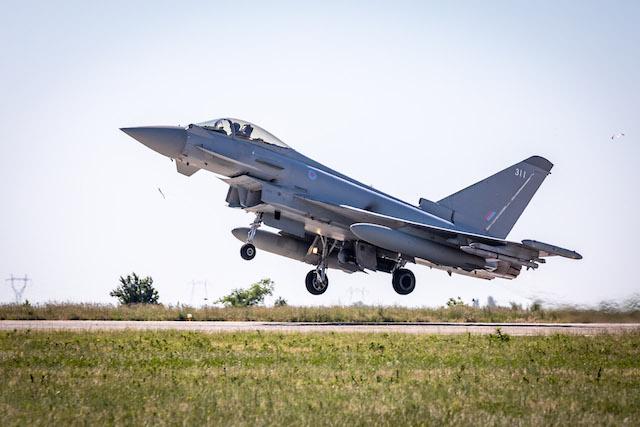
An RAF Typhoon takes off from a main operating base.
The UK Royal Air Force (RAF) plans to demonstrate soon that Eurofighter Typhoon FGR4s and Lockheed Martin F-35Bs can operate from roads as part of a distributed operations strategy, a senior commander told Aviation Week on June 13.
The demonstrations are expected to take place within the next year in both Finland and the UK, Air Marshal Harvey Smyth, the RAF's air and space commander, said on the sidelines of the Global Air and Space Chiefs Conference in London.
The Typhoon demonstrations will take place within a couple of months on highways in Finland, Smyth said. Unlike the UK and other NATO allies, Finland routinely practices operating a fleet of Boeing F/A-18 Hornets from its network of national highways, so the UK can leverage its existing infrastructure.
The plan for staging road operations with the F-35B still is being developed, Smyth said, but will likely take place in the UK. The RAF plans to lay down aluminum AM-2 mats along a strip of road up to 1,500 ft. long, allowing the F-35B to perform short takeoffs and vertical landings without damaging the underlying road, he added.
Both demonstrations are part of a wider effort to make RAF training more realistic and relevant in modern combat. Nordic countries such as Finland and Sweden have routinely practiced distributing their forces from main operating bases, with the assumption that a Russian attack would cripple most stationary infrastructure within hours of a war beginning.
Such distributed operating models also were used by NATO members during the Cold War. But the extra costs imposed by such a strategy, including the need for additional spares and trained maintainers, have driven many air forces to focus on optimizing the efficiency of main operating bases.
The costs of distributed operations have risen with the increasing sophistication of frontline aircraft, such as Typhoons and F-35Bs.
The demonstrations are intended to reveal any gaps in the RAF’s ability to operate away from its main operating bases for short periods, Smyth said.
“My whole approach to it has been: If you don’t try it, you don't know where the holes are,” Smyth told the conference. “So that’s what’s happening at the moment.”
